欲望号街车 A Streetcar Named Desire
对_欲望号街车_主题隐喻的解析_张黎娜
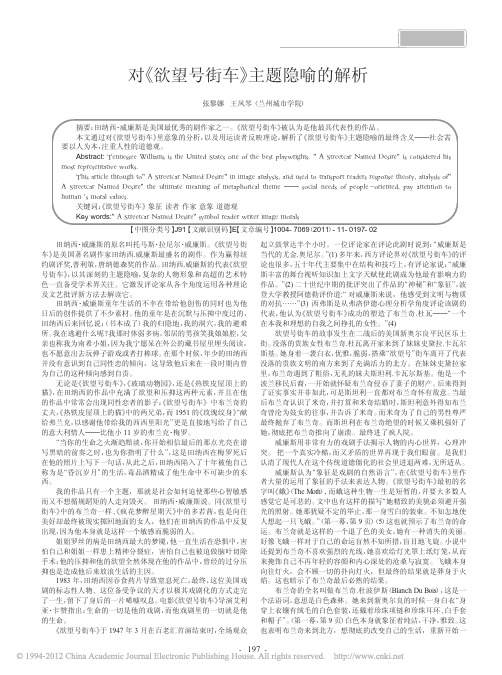
对《欲望号街车》主题隐喻的解析张黎娜王凤琴(兰州城市学院)摘要:田纳西·威廉斯是美国最优秀的剧作家之一。
《欲望号街车》被认为是他最具代表性的作品。
本文通过对《欲望号街车》里意象的分析,以及用运读者反映理论,解析了《欲望号街车》主题隐喻的最终含义———社会需要以人为本,注重人性的道德观。
Abstract:Tennessee Williams is the United States one of the best playwrights."A Streetcar Named Desire"is considered his most representative works.This article through to"A Streetcar Named Desire"in image analysis,and used to transport readers response theory,analysis of"A Streetcar Named Desire"the ultimate meaning of metaphorical theme———social needs of people-oriented,pay attention to human's moral values.关键词:《欲望号街车》象征读者作家意象道德观Key words:"A Streetcar Named Desire"symbol reader writer image morals【中图分类号】J91【文献识别码】E【文章编号】1004-7069(2011)-11-0197-02田纳西·威廉斯的原名叫托马斯·拉尼尔·威廉斯。
《欲望号街车》是美国著名剧作家田纳西.威廉斯最盛名的剧作。
以现实为基础的西方戏剧作品
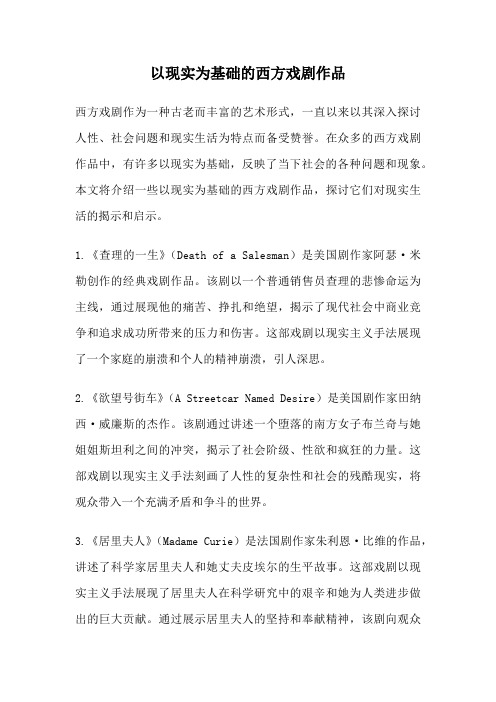
以现实为基础的西方戏剧作品西方戏剧作为一种古老而丰富的艺术形式,一直以来以其深入探讨人性、社会问题和现实生活为特点而备受赞誉。
在众多的西方戏剧作品中,有许多以现实为基础,反映了当下社会的各种问题和现象。
本文将介绍一些以现实为基础的西方戏剧作品,探讨它们对现实生活的揭示和启示。
1.《查理的一生》(Death of a Salesman)是美国剧作家阿瑟·米勒创作的经典戏剧作品。
该剧以一个普通销售员查理的悲惨命运为主线,通过展现他的痛苦、挣扎和绝望,揭示了现代社会中商业竞争和追求成功所带来的压力和伤害。
这部戏剧以现实主义手法展现了一个家庭的崩溃和个人的精神崩溃,引人深思。
2.《欲望号街车》(A Streetcar Named Desire)是美国剧作家田纳西·威廉斯的杰作。
该剧通过讲述一个堕落的南方女子布兰奇与她姐姐斯坦利之间的冲突,揭示了社会阶级、性欲和疯狂的力量。
这部戏剧以现实主义手法刻画了人性的复杂性和社会的残酷现实,将观众带入一个充满矛盾和争斗的世界。
3.《居里夫人》(Madame Curie)是法国剧作家朱利恩·比维的作品,讲述了科学家居里夫人和她丈夫皮埃尔的生平故事。
这部戏剧以现实主义手法展现了居里夫人在科学研究中的艰辛和她为人类进步做出的巨大贡献。
通过展示居里夫人的坚持和奉献精神,该剧向观众传递了积极的人生态度和对科学的崇高追求。
4.《红字》(The Scarlet Letter)是美国作家纳撒尼尔·霍桑的经典小说改编的戏剧作品。
该剧以17世纪新英格兰的一个小村庄为背景,讲述了女主人公海瑟·普林的婚外恋和社会对她的谴责。
这部戏剧以现实主义手法呈现了道德观念、宗教信仰和社会规范对个体命运的影响,引发观众对道德和自由的思考。
5.《福尔斯夫人》(Mrs. Warren's Profession)是爱尔兰剧作家乔治·伯纳德·肖的作品。
欲望号街车

THANK YOU!
6. symbolize
Blanche Dubois: White,pure Old South's plantation
symbolize
Stanley: The Norther emerging industries
symbolize
Lampshade:
No longer held in esteem escape from reality
symbolize
Bath: confess
self-atonement
begining
symbolize
Flowers: death
References
The Absence of Father in A Streetcar Named Desire (2015)陈彦 《欲望号街车》中父权制的加冕与脱冕 (2015) 祖华萍 Conflicts in A Streetcar Named Desire(2014)禹雪含 Analysis of Blanche ’ s Tragedy Life in the Streetcar Named Desire(2014)安晓芳 Symbolic Representation of Blanche DuBois’ s Tragic Fate in A Streetcar Named Desire(2013)陈微微
Stella Kowalski:
mild
kind-hearted escapist逃避现实的
Charactersቤተ መጻሕፍቲ ባይዱ
Stanley kowalski:a force of nature:
欲望号街车 ( a streetcar named desire)原创
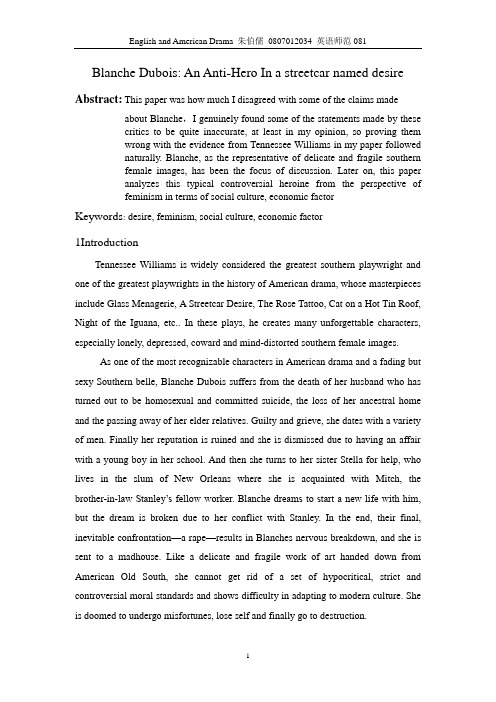
Blanche Dubois: An Anti-Hero In a streetcar named desire Abstract:This paper was how much I disagreed with some of the claims made about Blanche,I genuinely found some of the statements made by thesecritics to be quite inaccurate, at least in my opinion, so proving themwrong with the evidence from Tennessee Williams in my paper followednaturally. Blanche, as the representative of delicate and fragile southernfemale images, has been the focus of discussion. Later on, this paperanalyzes this typical controversial heroine from the perspective offeminism in terms of social culture, economic factorKeywords: desire, feminism, social culture, economic factor1IntroductionTennessee Williams is widely considered the greatest southern playwright and one of the greatest playwrights in the history of American drama, whose masterpieces include Glass Menagerie, A Streetcar Desire, The Rose Tattoo, Cat on a Hot Tin Roof, Night of the Iguana, etc.. In these plays, he creates many unforgettable characters, especially lonely, depressed, coward and mind-distorted southern female images.As one of the most recognizable characters in American drama and a fading but sexy Southern belle, Blanche Dubois suffers from the death of her husband who has turned out to be homosexual and committed suicide, the loss of her ancestral home and the passing away of her elder relatives. Guilty and grieve, she dates with a variety of men. Finally her reputation is ruined and she is dismissed due to having an affair with a young boy in her school. And then she turns to her sister Stella for help, who lives in the slum of New Orleans where she is acquainted with Mitch, the brother-in-law Stanley‟s fellow worker. Blanche dreams to start a new life with him, but the dream is broken due to her conflict with Stanley. In the end, their final, inevitable confrontation—a rape—results in Blanches nervous breakdown, and she is sent to a madhouse. Like a delicate and fragile work of art handed down from American Old South, she cannot get rid of a set of hypocritical, strict and controversial moral standards and shows difficulty in adapting to modern culture. She is doomed to undergo misfortunes, lose self and finally go to destruction.2 From the perspective of Tennessee WilliamsThrough the play , Wi lliams‟s sympathies lie with Blanche; this sympathy condemns the environment that has brought about Blanches tragic circumstances. Sympathy for Blanche in A Streetcar Named Desire is found in large part from the obvious trauma she has experienced due to the loss of her beloved husband, Allan Grey. Ironically, this aspect of the play is also one that critics and readers frequently use to demonize Blanche and disprove her role as a sympathetic character. critics claim Williams believes Blanche behaved hatefully toward her husband or failed him in some manner, leading to the death she now laments and Blanche had a responsibility as a wife to somehow rescue her husband from his own sexuality However, this claim compared with the trauma that the death has caused Blanche, and the implications of the overwhelming love she felt for Allan Grey may have been the last true emoti on‟Evidence also shows that the traumatic loss of her husband was a driving force that leads Blanche to Stella‟s doorstep. The scandalous event s that drive Blanche to her ultimate defeat do not begin until after Allan‟s death, and she even admits, “After the death of Allan—intimacies with strangers was all I seemed able to fill my empty heart with . . . I think it was panic, just panic, that drove me from one to another, hunting for some protection”. Williams implies that Blanche is not inherently impious; the disintegration of the loving marriage she once clung to leads her to a wrong path.Another situation in which Williams shows sympathy toward Blanche is her most dramatic victimization in the play: her rape. This scene requires careful analysis to understand that Stanley‟s rape of Blanche is indeed an antagonistic victimization, some claim that Williams goes to great lengths to obscure the fact that rape is a political crime ,making this seem a crime of passion and desire rather than one of violence, cruelty, and revenge .However, this argument is in complete dissonance with the obvious signs of Blanches noncompliance in the rape and utterly ignores Williams‟s vilification of Stanley throughout the play. In addition to Blanches evident noncompliance, Williams‟s vilification of Stanley throughout the entire play draws aclear distinction between victim and villain in the rape scene. Upon Stanley‟s first appearance, Williams describes how “he seizes women up at a glance . . . crude images flashing into his mind and determining the way he smiles at them,” and in the next line Blanche not coincidentally “draw s involuntarily back from his stare” (25). This significant exchange sets the mood for the tension between Blanche and Stanley that continues throughout the play. Several times Blanche regards Stanley with a “look of panic” or a “frightened look”, subtle stage directions that further Stanley‟s dark portrayal and foreshadow his victimization of Blanche. The fact that Stanley is characterized as erotic and Blanche merely as mentally weak and insecure reflects where Williams‟s sympathies lie; it does not imply that Blanche brings on Stanley‟s womanizing cruelty but rather that any woman could become his prey. Williams establishes Blanche‟s role as Stanley‟s victim far earlier on in the play than his physical domination of her, and Stanley‟s menacing characterization implies that Blanche‟s flawed chara cter does not give her singular potential to fall victim to him.In A Streetcar Named Desire‟s final scene, Williams makes his sympathetic tone toward Blanche tangible by exploiting her vulnerability before the indifference of the people and society that surrounds her. In addition to the ir onic comment “I have always depended on the kindness of strangers”, Blanche‟s vulnerability is also illuminated through stage directions such as “a look of sorrowful perplexity as though all human experience shows on her face” and “She turns her face to [the doctor] and stares at him with desperate pleading”. Blanches vulnerability leaves her sharply exposed before the cold unresponsiveness of the people who witness her defeat and represent the society in which she has been immersed: the men‟s poker game resumes abruptly after her dramatic exit, Blanches own sister Stella returns her pleas delivered in a “frightening whisper” by staring blankly back at her in a “moment of silence”, and Eunice simply responds to her claim of rape with, “Don‟t ever believe it. Life has got to go on”. The other characters in the play, representative of the era‟s misogynistic society, choose to disregard Blanches plight in accordance with what society expects. Blanche has fallen victim to the brutality of male dominance, yet even the women around her turn a blind eye to her suffering in order to avoid any disruption of theireveryday lives.One can easily deduce Williams‟s sympathy toward Blanche throughout the play and even in the circumstances of her downfall, which gives greater insight into both Williams‟s perceptions of her role as a character and his own views. Although at first glance Blanches checkered sexual past and addiction to the attention of men seem to safely secure her a pigeonhole in a womanizing society, in reality her experiences have only broken down her weak spirit and driven her to her downfall. Because of Williams‟s sympathy, Blanche becomes a tra gic protagonist in A Streetcar Named Desire and transforms the play into a sort of allegory: Williams uses her plight to criticize the social circumstances that have both shaped her flawed persona and led to her demise. This social commentary leaves Williams‟s motivations in question: as a homosexual male, why exactly is Williams so sympathetic toward Blanche? One possibility is that Williams‟s homosexuality in a heavily masculine society rendered him naturally sympathetic toward the plight of women, with whom he probably identified more than with the archetypical male of the era. Another explanationis that, as a homosexual, Williams criticized heterosexuality itself, condemning the sexuality that turns Blanche into a victim, Stanley into a monster, and the rest of the characters into puppets on socio-cultural strings. Altho ugh Williams‟s personal motives are debatable, the story he creates with Blanche Dubois presents a clearly sympathetic portrait of a woman .3. Social cultureIt is reasonable that almost every person‟s fame is closely related to the place where he/she grows up, so it is necessary to probe into briefly the history of the South and its cultural background in order to have a deeper investigation of the heroine‟s destruction. The prewar South is full of contradictory memories. The Southern plantation economy set a division between planters and slaves. The slaves worked all-day long under the whip, whereas the rich planters behaved like feudal lords and lived a luxury life. Under the influence of such an economic environment, the upper class of the South believ ed “itself to be unique, because it projected itself as suchthrough its writers and spokesmen, because it manufactured a folklore of plantation aristocracy, of the magnolia paradise of the antebellum days, of the Greek society and the peculiar institution of slavery, of the Lost Cause, of White Supremacy, and of the need to be born there to understand it all, and Southerners repeated this litany so many times that it became true—or almost so.” (Horton, 1987: 377) Then the framework of the South can be established: its social pattern is based on manor; its civilization is Permeated with idealized chivalry; its ruling class behaves as an aristocracy, either a gentleman or a lovely lady. They live in large mansions, own lots of estates, and have colorful soci al life. It is a “world singularly polished and mellow and poised, wholly dominated by ideals of honor and chivalry and noblesse” (Li, 2004: 21), where Blanche was brought up and used to live for years. In fact, the self-contained and self-sufficient South is an epitome of patriarchal society. Simone de Boudoir points out in her book The second sex, “males don‟t interpret females according to females Themselves, whereas they regard females as independent ones… males can be taken as the reference to define and distinguish females, while the reference to define and distinguish males cannot be females. …She‟ is the Essential in opposition of the Inessential. …He‟ is the subject and the Absolute, whereas …she‟ is the other.” (Boudoir, 1998:11) From the above arguments, it can be seen that there exists a relation of subordination and dominance, the essential and inessential, object and subject, and the other and self between males and females. Therefore, in patriarchal society, males stand at a positive position and females play a passive and inessential role. Charlotte Perkins Gilman also considers gender as the core of analysis to reveal the fact of gender oppression, pointing out that the females‟ dependence on males is not due to physiological difference but the result of coercive act of male culture (Jin, 2004:367). Particularly Kate Millet holds in Sexual Politics that the gender relation between males and females is a kind of power one, that is “sexual politics” (Jin, 2004:595). Similarly, in the south, the men as the center of the society control money, power and even women. They form their own standards to evaluate the society and other people. Women live a life of dependence on them, both economically and mentally. And there is another obvious feature here. That is the tendency toward idealism, romanticismand hedonism. Women have to keep beautiful appearance, behave graciously and flirt with men in order to please them. It is inevitable that women would lose their self when faced with traditional customs and strict standards set by men.4. Economical factorMarxism feminist theory argues that economic factor is the root of the oppression that women suffer from (Luo, 2004:100). The economic dependence on men deprives women of the right to dominate their own fate and the strength to struggle against men so that they are reduced into the other affiliated by men. British writer, Virginia Woolf thinks that women‟s independent economic status is the material foundation to obtain personal freedom. If women are dependent on men economically, they are deprived of all the equal rights (Wu, 2005:69). The economic structure of plantation in the South removes women from productive labor so that they cannot obtain the independent economic status. Even if Blanche is forced to work outside because of economic necessity, she has to choose to be a teacher in a high school which is regarded as a decent occupation of women. And as Blanche tells Mitch her miserable situation, “A teacher‟s salary is barely sufficient for her living expenses. I didn‟t save a penny last year and so I had to come here for the summer.”(Williams, 2005:1179) Evidently, her meager incomes are barely enough to maintain her extravagant life. So, it is quite natural that she has to turn to men for help after the suicide of her husband, death of relatives and loss of her manor, and she considers it the only choice to face the cruel environment, as she says, “Whoever you are-I have always dependedon the kindness of strangers” (Williams, 2005:1203) She is in and out through the gate of the second-rate hotel of Laurel and keeps dating with different men until she is banished from the town. Then she doesn‟t have any thing to her name except a dishonorable past and a trunk that just contains her clothes and some worthless papers, so she has no alternative but to seek refuge from her sister Stella in New Orleans. In Stella‟s house, she seduces her brother-in-law Stanley when meeting him for the first time, because she understands that she needs his financial support when she stays there. She says, “…maybe he (Stanley) is what we need to mix with our blood nowthat we‟ve lost Belle Reve.”(Williams, 2005:1156) But her behavior of Southern culture of delicacy and romance doesn‟t fit in with Stanley who is an animalize d person with peevish disposition. It is an irony that just immediately after she resolves to Stella at the poker night “I‟m going to do something. Get hold of myself and make myself a new life,” (Williams, 2005:1166), she turns to a married millionaire S hep Huntleigh for financial support. Her excuse is that she only has “sixty-five measly cents in coin of the realm” in the purse. Thus having recourse to this millionaire seems an effective means “to get hold of some money” and “the way out.” (Williams, 2005:1166) However, the help call and the message are not sent out. And her next proposal is Stanley‟s fellow worker Mitch, by whom she wants to get rid of the destitution and the dependence on Stanley. She thinks if the marriage with Mitch happens, she can “leave here (Stella‟s home), and not be anyone‟s problem” (Williams, 2005:1173) and live a stable life. But things do not turn out as one wishes. When knowing her past, Mitch abandons her ruthlessly. After she parts company with Mitch, she is so depressed that she creates an illusion for herself, in which she has received a telegram form Shep Huntleigh inviting her to a cruise of the Caribbean on a yacht. Without exception her luxurious life is again built on the support of men, even in an illusion. Actually, this millionaire may not exist at all, and just appears an imagined person in Blanche‟s one-sided statement. He stands for an ideal symbol that can bring material strength of dependence and guarantee for women, more exactly for Blanche. That he never shows up and gives the substantial aid to Blanche may suggest that if women place their hope and fortune on men, their oppressed and subordinate status can never be changed, and their dream of happy life is bound to break. In short, women‟s economic depende nce on men in patriarchal society serves as one of factors that result in Blanche‟s destruction.5.ConclusionBlanche is one of such females born and brought up in Old South who feels difficult in mastering her own fate and facing conflicts brought by industrialization and commercialization under the restriction and oppression of patriarchy, and onlyhides herself in imaginative world to release herself. Williams extends his great sympathy to this victim of patriarchy. However, it is evident from what Williams depicts about women that once they yield themselves to patriarchy, instead of struggling indomitably for their freedom, their miserable situation will not be changed.REFERENCES[1]Beauvoir, Simone de. (1998). The second sex. (Tao Tiezhu, Trans.). Beijing: China Books Press.[2]Horton, Rod W. & Edwards, Herbert W.. (1987). Backgrounds of American literary thought (3rd ed.).[3]JIN Li. (2004). Literary females and female literature. Beijing: Foreign Language Teaching and Researching Press.[4]LI Li. (2004). Women‟s growth: a feminist approach to Tennessee Williams‟s works. Tianjin: Tianjin[5]People‟s Publishing House. [4]LUO Ting. (2004). Feminist literary criticism in West and China. Beijing: China Social Science Press.[6]Williams, Tennessee. A streetcar named desire. Alison Booth, J. Paul Hunter, & Kelly J. Mays (Eds.)。
欲望号街车英文影评
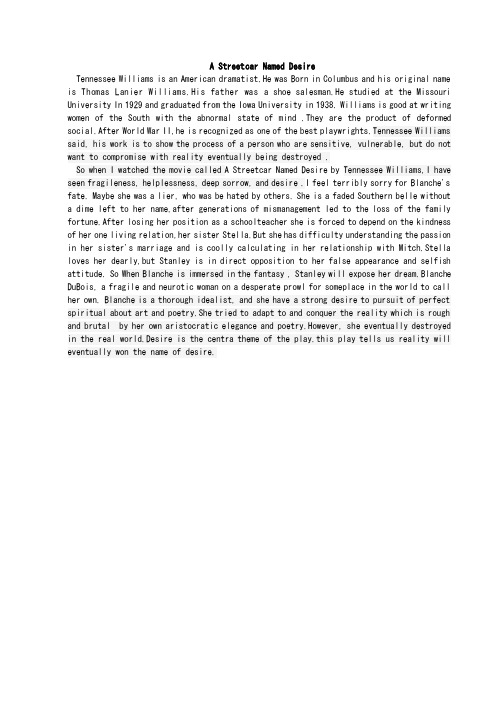
A Streetcar Named DesireTennessee Williams is an American dramatist.He was Born in Columbus and his original name is Thomas Lanier Williams.His father was a shoe salesman.He studied at the Missouri University In 1929 and graduated from the Iowa University in 1938. Williams is good at writing women of the South with the abnormal state of mind .They are the product of deformed social.After World War II,he is recognized as one of the best playwrights.Tennessee Williams said, his work is to show the process of a person who are sensitive, vulnerable, but do not want to compromise with reality eventually being destroyed .So when I watched the movie called A Streetcar Named Desire by Tennessee Williams,I have seen fragileness, helplessness, deep sorrow, and desire .I feel terribly sorry for Blanche's fate. Maybe she was a lier, who was be hated by others. She is a faded Southern belle without a dime left to her name,after generations of mismanagement led to the loss of the family fortune.After losing her position as a schoolteacher she is forced to depend on the kindness of her one living relation,her sister Stella.But she has difficulty understanding the passion in her sister's marriage and is coolly calculating in her relationship with Mitch.Stella loves her dearly,but Stanley is in direct opposition to her false appearance and selfish attitude. So When Blanche is immersed in the fantasy , Stanley will expose her dream.Blanche DuBois, a fragile and neurotic woman on a desperate prowl for someplace in the world to call her own. Blanche is a thorough idealist, and she have a strong desire to pursuit of perfect spiritual about art and poetry.She tried to adapt to and conquer the reality which is rough and brutal by her own aristocratic elegance and poetry.However, she eventually destroyed in the real world.Desire is the centra theme of the play.this play tells us reality will eventually won the name of desire.。
探究欲望号街车中女主人公的悲剧命运摘要
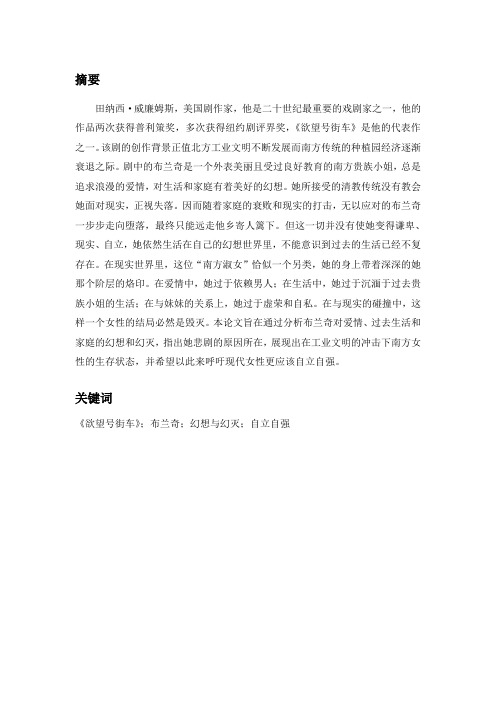
摘要田纳西·威廉姆斯,美国剧作家,他是二十世纪最重要的戏剧家之一,他的作品两次获得普利策奖,多次获得纽约剧评界奖,《欲望号街车》是他的代表作之一。
该剧的创作背景正值北方工业文明不断发展而南方传统的种植园经济逐渐衰退之际。
剧中的布兰奇是一个外表美丽且受过良好教育的南方贵族小姐,总是追求浪漫的爱情,对生活和家庭有着美好的幻想。
她所接受的清教传统没有教会她面对现实,正视失落。
因而随着家庭的衰败和现实的打击,无以应对的布兰奇一步步走向堕落,最终只能远走他乡寄人篱下。
但这一切并没有使她变得谦卑、现实、自立,她依然生活在自己的幻想世界里,不能意识到过去的生活已经不复存在。
在现实世界里,这位“南方淑女”恰似一个另类,她的身上带着深深的她那个阶层的烙印。
在爱情中,她过于依赖男人;在生活中,她过于沉湎于过去贵族小姐的生活;在与妹妹的关系上,她过于虚荣和自私。
在与现实的碰撞中,这样一个女性的结局必然是毁灭。
本论文旨在通过分析布兰奇对爱情、过去生活和家庭的幻想和幻灭,指出她悲剧的原因所在,展现出在工业文明的冲击下南方女性的生存状态,并希望以此来呼吁现代女性更应该自立自强。
关键词《欲望号街车》;布兰奇;幻想与幻灭;自立自强AbstractTennessee Williams, American playwright, is one of the most important playwrights in the 20th century. His works won the Pulitzer Prize twice and New York Drama Critics’ Circle Award for several times. A Streetcar Named Desire is one of his representatives. The background of the play is during the period when the northern civilization continuously developed and the traditional southern plantation economy gradually declined. Blanche in the play was a southern aristocratic lady who was not only beautiful but also got great education. She always pursued romantic love and had good fantasy of life and family. The puritan tradition that she received didn’t teach her to face the reality and confront the loss. With the decline of the family and dash of the reality, she degenerated step by step and had to went away to seek refuge with her sister Della. However the whole thing couldn’t make her become humble, realistic and independent. She still lived in her fantasy world and couldn’t realize that the past had gone forever. In the real world, this southern gentlewoman was just like a “special”. Her class leaved deep marks on her. In her love life, she depended too much on men; in her life, she abandoned oneself to the life that she once lived; in her relationship with her sister, she was too peacockish and selfish. In the collision with reality, the end of this sort of woman must be ruin. This essay aims to analyze Blanche’s illusion and disillusion of romantic love, past life and family love and point s out the reasons that caused her tragic fate. By doing so, readers can have a brief idea of the living states of southern women under the impact of the industrial civilization with the hope for evoking modern women to be more dependent and self-reliant.Key wordsA Streetcar Named Desire; Blanche; illusions and disillusions; self-reliance。
欲望号街车 A Streetcar Named Desire 中英文剧本

你很好啊
God love you for a liar!
你骗人嘛
Daylight never exposed so total a ruin!
阳光怎么可能照到废墟上呢
But you-you've put on some weight.
不过你变胖了
Yes you're just as plump as a little partridge!
哎呀,我都说什么啦
I didn't mean to say that.
我不是有心说这些的
I meant to be nice about it and say-
我意思是说那很漂亮
oh, what convenient location and such Precious Lamb!
你还没有问我为什么会...
from the school before the spring term ended.
在春季学期结束前离开学校呢
Well, I thought you'd volunteer that information if you wanted to tell me.
Only Mr.Edger Allen Poe could do justice to it.
只有艾德格.爱伦.坡的小说才会提及这么糟糕的地方
What are you doing in that horrible place?
你在那里做什么?
Oh, What I am saying?
Thank you
谢谢你
He suggested I take a leave of absence.
《欲望号街车》的二重性研究
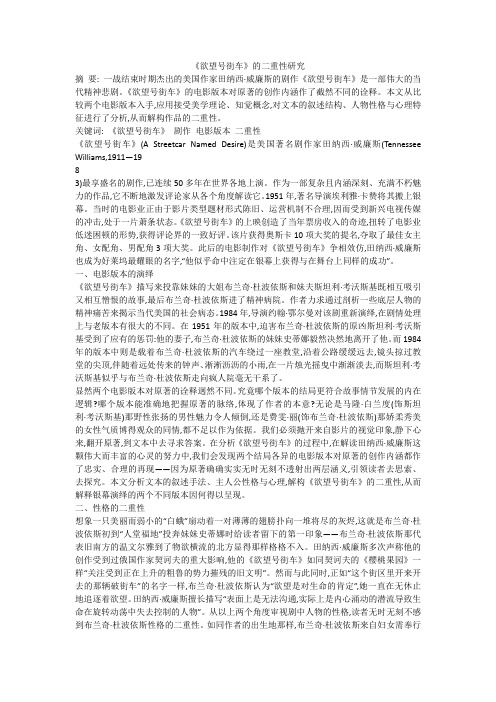
《欲望号街车》的二重性研究摘要: 一战结束时期杰出的美国作家田纳西·威廉斯的剧作《欲望号街车》是一部伟大的当代精神悲剧。
《欲望号街车》的电影版本对原著的创作内涵作了截然不同的诠释。
本文从比较两个电影版本入手,应用接受美学理论、知觉概念,对文本的叙述结构、人物性格与心理特征进行了分析,从而解构作品的二重性。
关键词: 《欲望号街车》剧作电影版本二重性《欲望号街车》(A Streetcar Named Desire)是美国著名剧作家田纳西·威廉斯(Tennessee Williams,1911—1983)最享盛名的剧作,已连续50多年在世界各地上演。
作为一部复杂且内涵深刻、充满不朽魅力的作品,它不断地激发评论家从各个角度解读它。
1951年,著名导演埃利雅·卡赞将其搬上银幕。
当时的电影业正由于影片类型题材形式陈旧、运营机制不合理,因而受到新兴电视传媒的冲击,处于一片萧条状态。
《欲望号街车》的上映创造了当年票房收入的奇迹,扭转了电影业低迷困顿的形势,获得评论界的一致好评。
该片获得奥斯卡10项大奖的提名,夺取了最佳女主角、女配角、男配角3项大奖。
此后的电影制作对《欲望号街车》争相效仿,田纳西·威廉斯也成为好莱坞最耀眼的名字,“他似乎命中注定在银幕上获得与在舞台上同样的成功”。
一、电影版本的演绎《欲望号街车》描写来投靠妹妹的大姐布兰奇·杜波依斯和妹夫斯坦利·考沃斯基既相互吸引又相互憎恨的故事,最后布兰奇·杜波依斯进了精神病院。
作者力求通过剖析一些底层人物的精神痛苦来揭示当代美国的社会病态。
1984年,导演约翰·鄂尔曼对该剧重新演绎,在剧情处理上与老版本有很大的不同。
在1951年的版本中,迫害布兰奇·杜波依斯的原凶斯坦利·考沃斯基受到了应有的惩罚:他的妻子,布兰奇·杜波依斯的妹妹史蒂娜毅然决然地离开了他。
- 1、下载文档前请自行甄别文档内容的完整性,平台不提供额外的编辑、内容补充、找答案等附加服务。
- 2、"仅部分预览"的文档,不可在线预览部分如存在完整性等问题,可反馈申请退款(可完整预览的文档不适用该条件!)。
- 3、如文档侵犯您的权益,请联系客服反馈,我们会尽快为您处理(人工客服工作时间:9:00-18:30)。
History and related research of the topic
• Interpretation on the Tragic Fate of Blanche in Tennessee William’s A Streetcar Named Desire 对田纳西·威廉的《欲望号街车》布兰奇悲 剧命运的解读 • Blanche Must be Mad: A Re-reading of Blanche’s Madness in a Streetcar Named Desire 重读《欲望号街车》中白兰奇的疯狂 • Representation of Gender and Sexuality in a Streetcar Named Desire 《欲望号街车》中对性别与两性的表现 • On the Destruction of Blanche Dubois’s Ego: Psycho-social Analysis of a Streetcar named Desire 论布朗琪·杜波依斯自我的毁灭 ——《欲望号街车》的精神社会分析
《欲望号街车》的主题意蕴
• 内容提要:本文通过“同一者”、“他者”、 “权威”等范畴进一步分析了《欲望号街车》中 扑朔迷离的人物关系。论文在文本分析的基础上 认为,现代工业社会中“权威”在对“性异常”、 “疯癫”等边缘文化拒绝与禁闭的同时消解了自 身,从而揭示剧作所隐含的后现代主义特质。 • 主题词:田纳西·威廉斯 他者 后现代主义
• Although we learn later in the play that desire is one of her driving motivations, Blanche seeks to deny it. • Physical desire, and not intellectual or spiritual intimacy, is the heart of Stella’s and Stanley’s relationship. • Desire is also Blanche’s undoing, because she cannot find a healthy way of dealing with her natural urges - she is always either trying to suppress them or pursuing them with abandon.
Loneliness
• Blanche desperately seeks companionship and protection in the arms of strangers. • Blanche is in need of a defender.
Desire---central theme
Cruelty
• This sin is Stanley’s specialty. His final assault against Blanche is a merciless attack against an already-beaten foe. • Blanche, on the other hand, is dishonest but she never lies out of malice. • Her cruelty is unintentional; often, she lies in a vain or misguided effort to please.
By Li Ying
• • • •
Illusion versus reality Cruelty Loneliness Desire
Ilห้องสมุดไป่ตู้usion versus Fantasy
• Blanche dwells in illusion; fantasy is her primary means of selfdefense, both against outside threats and against her own demons. • Fantasy has a liberating magic that protects her from the tragedies she has had to endure.
